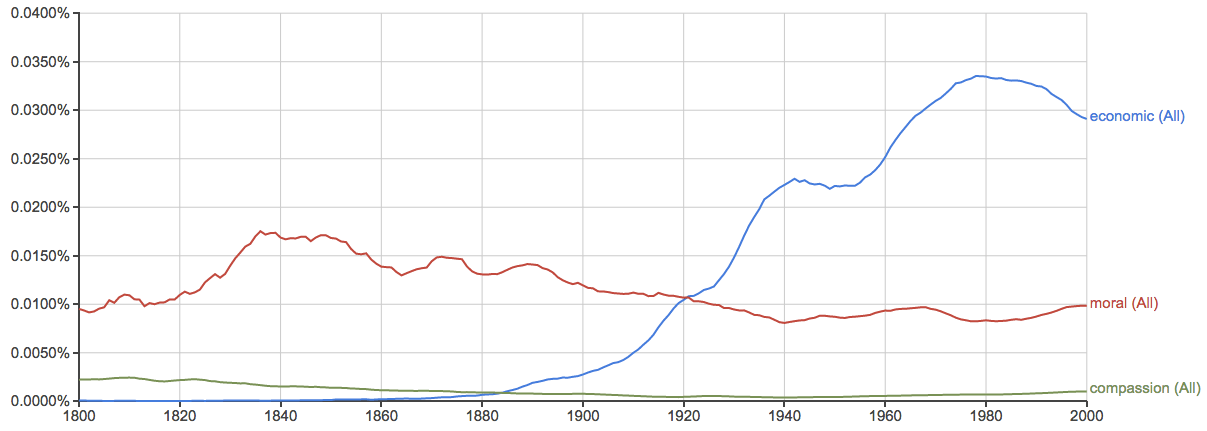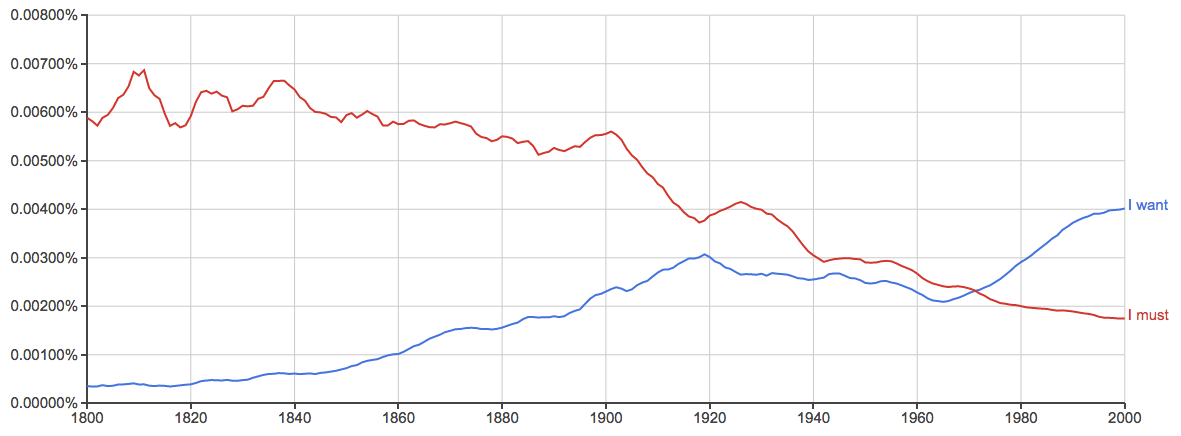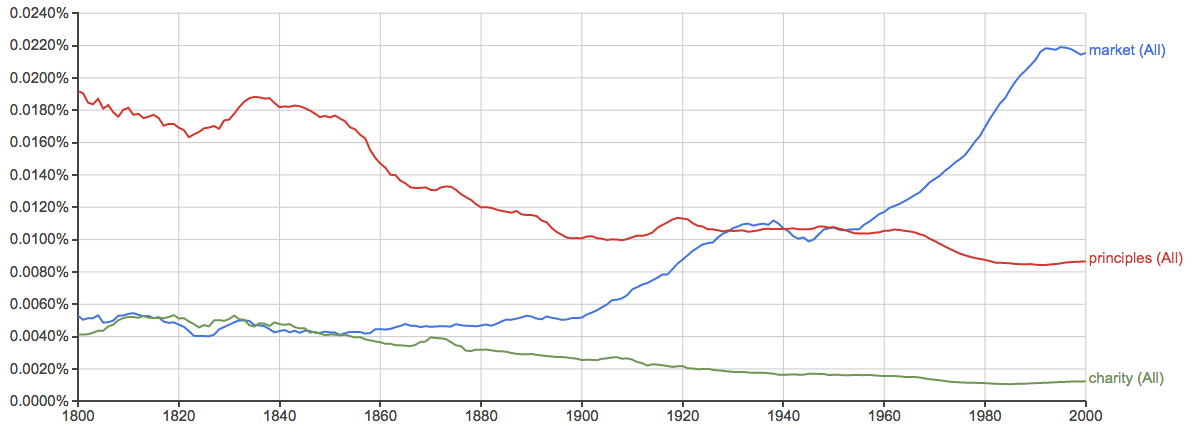
Science points to a crazy number of benefits from being more compassionate:
Not too shabby.
Which raises a good question: if it does all this great stuff, why the heck aren’t we more compassionate?
The World Is Working Against You
Our lives are a lot more focused on numbers and economics than love and compassion these days. Everything is dollars and cents, hours and minutes.
Economics is an incredibly powerful tool but when you assign a price to everything and dismiss feelings, you can enter dangerous territory. Homo economicus is a sociopath.
I’m sure some of you think this is naive or silly. That things have always been like this. You’re wrong, by the way.
The Google Ngram viewer is an amazing tool that allows us to look at how often terms have been mentioned in books over the past few hundred years. (Big thanks to my friend Spencer Glendon for his insight here.)
How does “economic” fare against “moral” and “compassion” lately? Um, well…

Are we focused on our compassionate ethical duties to one another? Or the stuff we want want want?

Are we thinking more about principles and charity — or markets?

(For more on how giving can make you more successful, click here.)
There aren’t many forces pushing back, reminding us to be compassionate in today’s market-driven world.
What does the research say still teaches us compassion?
Grandmom does. Seriously. But Grandmom, as awesome as her oatmeal cookies are, can’t fight the whole world by herself.
So what do we do?
The Solution Is All in Your Head (Kinda)
Here’s what’s interesting: research shows compassion is contagious. When we feel it toward one person we’ll extend it to others around us even without realizing it.
This idea might be new to you and me but Buddhists have known it for over 1000 years. (I’m late to the party on a lot of stuff, frankly. Still not caught up on Mad Men, either.)
Buddhists call it “metta” (there’s actually some funky punctuation to it but there’s no way I’m gonna find that on my keyboard so just roll with me here). More commonly it goes by the name “loving-kindness meditation.” Buddhists use it to increase compassion.
Here’s the problem: LKM is pretty much the ground zero of self-help corniness. What does Buddhism say are some of the benefits of loving-kindness meditation?
Via Lovingkindness: The Revolutionary Art of Happiness:
Devas [celestial beings] and animals will love you.
Devas will protect you.
External dangers [poisons, weapons, and fire] will not harm you.
You will be reborn in happy realms.
My first reaction? I think we’re done here. Thank you for calling.
Scientists have recently figured out something about LKM though: it actually works.
No, you’re not gonna be immune to fire and poison and, no, woodland elves will not build you a treehouse. But as for that compassion part? Yeah, it really does the job.
Via Real Happiness: The Power of Meditation:
The researchers also found that both meditating groups showed greater thickening of the insular cortex, a part of the brain associated with regulating emotions, and more activity in the amygdala, the part of the brain that assesses the emotional content of incoming stimuli, than did the non-meditating control group. The investigators concluded that the practice of lovingkindness meditation trains the brain to make us more empathic and more capable of reading subtle emotional states.
And that’s far from one isolated piece of research. A 2012 Harvard study showed:
Overall, these results are consistent with the overarching hypothesis that meditation may result in enduring, beneficial changes in brain function, especially in the area of emotional processing.
No, you don’t have to convert to Buddhism or believe in funky celestial beings. It’s an effective secular exercise for your compassion muscle.
(For more on the benefits of mindfulness meditation and how to do it, click here.)
So we have the answer right? Loving-Kindness Meditation to the rescue. But how do we do it?
The “How To”
Like I said, the process comes off as way corny — but it makes sense.
How do you feel when you think about loved ones? Warm and fuzzy. Why keep pictures of your kids or your partner on your desk or in your wallet? Even more fuzzies.
That’s the goal here, really. We want to broaden the fuzzy. Fuzzy momentum, if you will. Extend the fuzzy feelings from those you already are compassionate toward to neutral and even to difficult people.
The best instructions I’ve found (that have no scientific jargon or mentions of woodland spirits) come from 10% Happier, the great book by Dan Harris:
1. This practice involves picturing a series of people and sending them good vibes. Start with yourself. Generate as clear a mental image as possible.
2. Repeat the following phrases: May you be happy, May you be healthy, May you be safe, May you live with ease. Do this slowly. Let the sentiment land. You are not forcing your well-wishes on anyone; you’re just offering them up, just as you would a cool drink. Also, success is not measured by whether you generate any specific emotion. As Sharon says, you don’t need to feel “a surge of sentimental love accompanied by chirping birds.” The point is to try. Every time you do, you are exercising your compassion muscle. (By the way, if you don’t like the phrases above, you can make up your own.)
3. After you’ve sent the phrases to yourself, move on to: a benefactor (a teacher , mentor, relative), a close friend (can be a pet, too), a neutral person (someone you see often but don’t really ever notice), a difficult person, and, finally, “all beings.”
Yes, it sounds silly but studies show it works.
Don’t get too worried about details. It’s not a magic spell and this ain’t Hogwart’s. You can customize it. The important thing is wishing others well and expanding that feeling from those you feel strongly about to a wider and wider circle of people.
(For my interview with Good Morning America anchor and meditation-skeptic-turned-believer Dan Harris, click here.)
Time to round this up and build a path forward.
Enough Reading. Time For Doing.
Give loving-kindness meditation a shot. Or you can go straight to the next step and help others. Support. Give.
Volunteering makes us happier. Too busy? Ironically, studies show giving our time to others makes us feel less time-strapped.
Seriously too busy? Then show a little compassion by buying lunch for a friend. It’ll make you happier too.
Via Happy Money: The Science of Smarter Spending:
By the end of the day, individuals who spent money on others were measurably happier than those who spent money on themselves — even though there were no differences between the groups at the beginning of the day. And it turns out that the amount of money people found in their envelopes — $5 or $20 — had no effect on their happiness at the end of the day. How people spent the money mattered much more than how much of it they got.
The great TEDx talk by Harvard professor Michael Norton explains it here.
Whatever you do, the key word here is exactly that: do. It’s not think compassion and you will act more compassionate. It’s act more compassionate and you will feel more compassionate.
Meditation expert Sharon Salzberg recounts an old story that sums it up better than any research abstract.
Via Real Happiness: The Power of Meditation:
A grandfather (occasionally it’s a grandmother) imparting a life lesson to his grandson tells him, “I have two wolves fighting in my heart. One wolf is vengeful, fearful, envious, resentful, deceitful. The other wolf is loving, compassionate, generous, truthful, and serene.”
The grandson asks which wolf will win the fight.
The grandfather answers, “The one I feed.”
This piece originally appeared on Barking Up the Wrong Tree.
Join over 151,000 readers. Get a free weekly update via email here.
Related posts:
How To Stop Being Lazy And Get More Done – 5 Expert Tips
6 Things The Most Productive People Do Every Day
New Harvard Research Reveals A Fun Way To Be More Successful
More Must-Reads From TIME
- The 100 Most Influential People of 2024
- The Revolution of Yulia Navalnaya
- 6 Compliments That Land Every Time
- What's the Deal With the Bitcoin Halving?
- If You're Dating Right Now , You're Brave: Column
- The AI That Could Heal a Divided Internet
- Fallout Is a Brilliant Model for the Future of Video Game Adaptations
- Want Weekly Recs on What to Watch, Read, and More? Sign Up for Worth Your Time
Contact us at letters@time.com